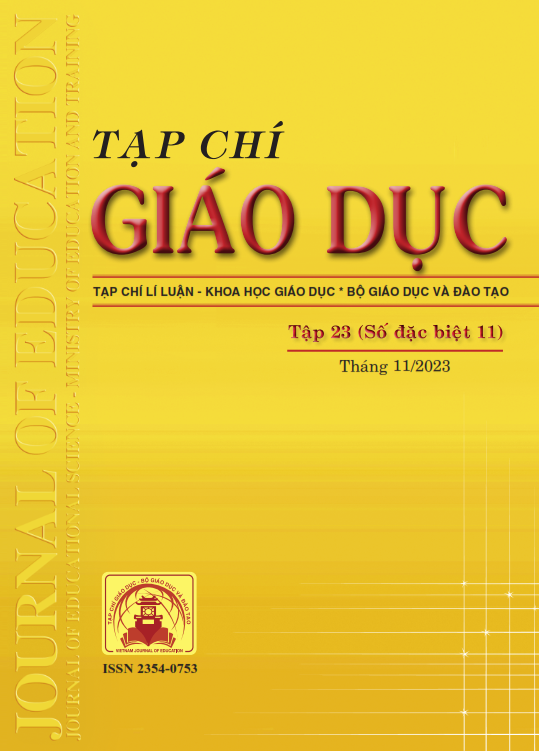Phát triển năng lực tự học hóa học trong dạy học chủ đề hóa học (môn Khoa học tự nhiên) trung học cơ sở với sự hỗ trợ của AI Chatbot
Tóm tắt
In the field of education, AI Chatbot is becoming popular and widely used in the teaching process, helping teachers present lessons more effectively and save time. At the same time, developing students' self-study competence is also an important issue, in order to equip them with self-study skills, self-management of learning and readiness for lifelong learning. The article is based on the chemistry self-study competency framework built for secondary school students in teaching Chemistry with the support of AI Chatbot, helping teachers design lesson teaching scenarios: Properties of Metals, metal activity series (VNEN book Natural Sciences 9, volume 1, lesson 1, page 3) and upload the lesson script to AI Chabot for use in teaching Chemistry topics. From there, it is expected to develop students' competence to self-study chemistry with the support of AI Chatbot before class, during class and after class. The results show a difference between the experimental class and the control class. By developing self-study competence with the support of AI Chatbot, teachers become instructors, helping students develop their self-study competence effectively, providing necessary support, and creating a better learning environment for students.
Tài liệu tham khảo
Abbasi, S., Kazi, H., & Hussaini, N. N. (2019). Effect of chatbot systems on student’s learning outcomes. Sylwan, 163(10), 49-63.
Baskara, F. R. (2023). Chatbots and Flipped Learning: Enhancing Student Engagement and Learning Outcomes through Personalised Support and Collaboration. IJORER: International Journal of Recent Educational Research, 4(2), 223-238.
Bộ GD-ĐT (2018). Chương trình giáo dục phổ thông môn Hóa học (ban hành kèm theo Thông tư số 32/2018/TT-BGDĐT ngày 26/12/2018 của Bộ trưởng Bộ GD-ĐT).
Burkhard, M., Seufert, S., Cetto, M., & Handschuh, S. (2022). Educational Chatbots for Collaborative Learning: Results of a Design Experiment in a Middle School. International Association for Development of the Information Society.
Cunningham-Nelson, S., Boles, W., Trouton, L., & Margerison, E. (2019). A review of chatbots in education: practical steps forward. In 30th annual conference for the australasian association for engineering education (AAEE 2019): educators becoming agents of change: innovate, integrate, motivate (pp. 299-306). Engineers Australia.
Nguyen Minh Giam, Ngo Tu Thanh (2022b). The Process of using AI Chatbot to Teach Chemistry. The Proceeding of International Conference ICSS 2022.
Kengam, J. (2020). Artificial intelligence in education. Research Gate. Science and Technology Department Bournemouth University Bournemouth, United Kingdom.
Nguyễn Minh Giám, Nguyễn Văn Đốc, Nguyễn Thị Hoài Nam, Nguyễn Thị Hương Giang, Ngô Tứ Thành (2023). Xây dựng khung năng lực tự học cho học sinh trung học cơ sở trong dạy học môn Khoa học tự nhiên với sự hỗ trợ của AI Chatbot. Tạp chí Giáo dục, 23(số đặc biệt 9), 35-42.
Đã Xuất bản
Cách trích dẫn
Số
Chuyên mục
Giấy phép

Tác phẩm này được cấp phép theo Ghi nhận tác giả của Creative Commons Giấy phép quốc tế 4.0 .












